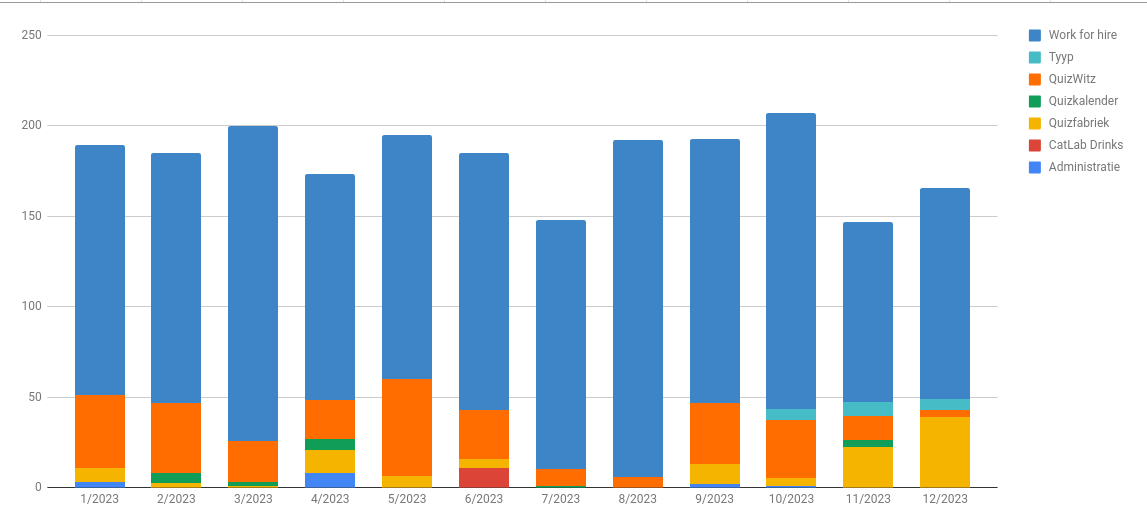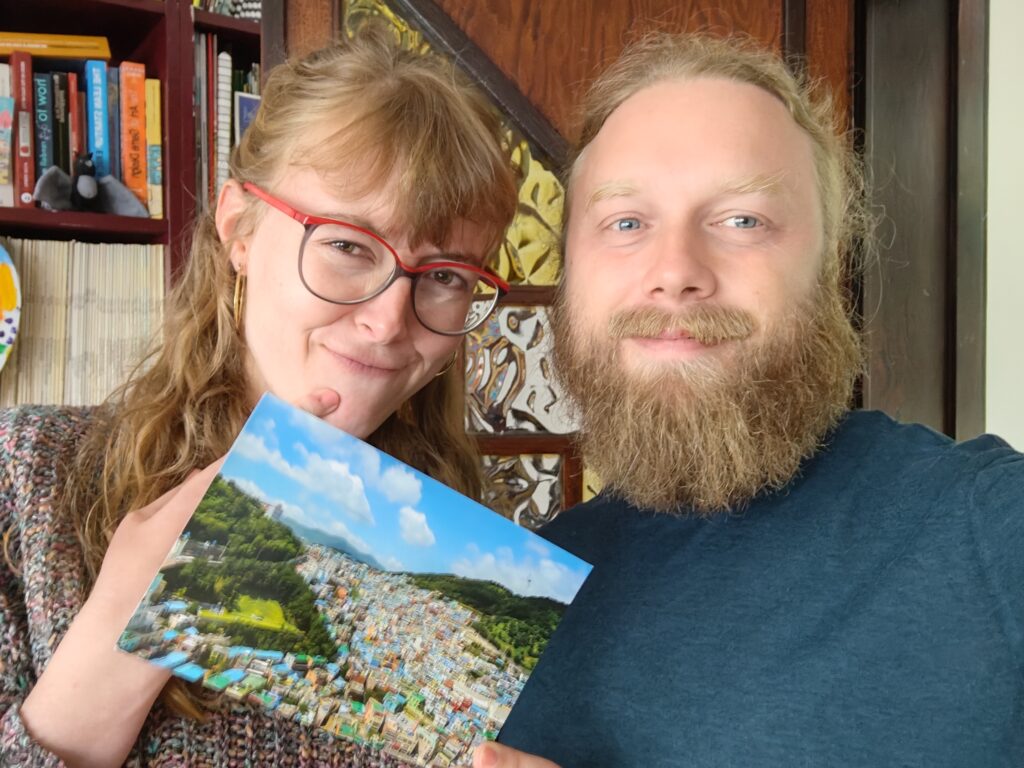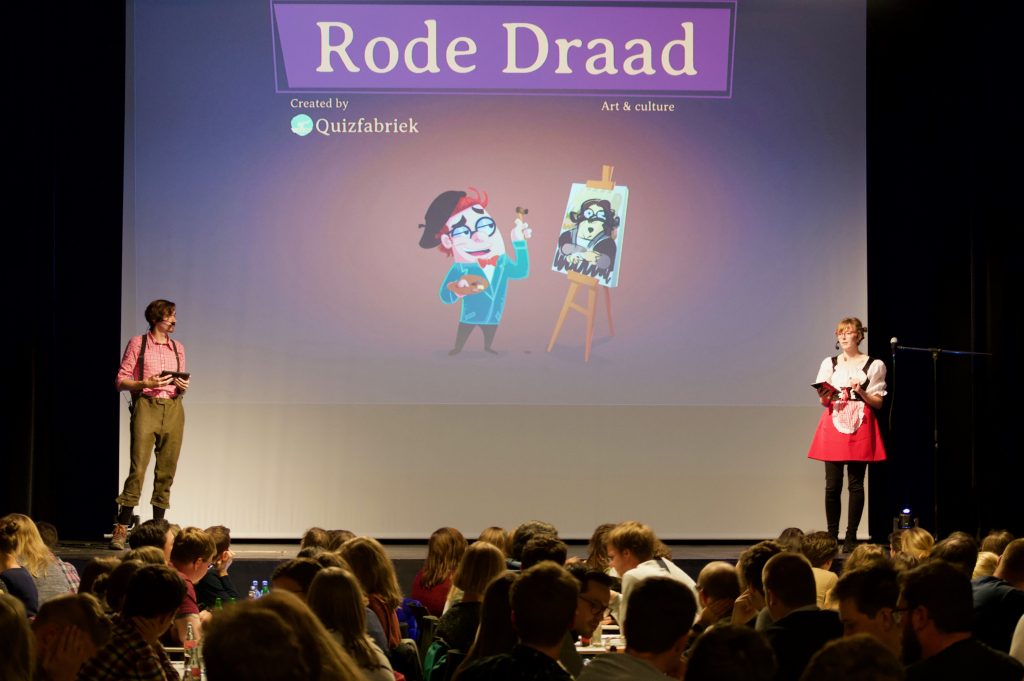Happy 2024! Here we are for another yearly review of what I have spent time on. Slightly delayed due to loads of “more important” work, but here we are.
For the past 4 years I’ve been tracking what I’ve been spending my – what I consider to be – work time, and so I did for 2023. This report is an insight on how I spent quite a large portion of my life.
The data
| Project | Hours | Revenue | Hourly |
| Work for hire | 1.702,06 | € 122.157,43 | € 71,77 |
| QuizWitz | 301,75 | € 8.236,86 | € 27,30 |
| Quizfabriek | 113,00 | € 2.809,57 | € 24,86 |
| Quizkalender | 18,50 | € 328,15 | € 17,74 |
| Tyyp | 20,00 | € 0,00 | € 0,00 |
| Administratie | 14,00 | € 0,00 | € 0,00 |
| CatLab Drinks | 11,00 | € 0,00 | € 0,00 |
I’ve spent a total of 2.180,31 hours working in 2023. This averages out on a hearly 45,42 hours per week. A pretty big increase compared with 2022, but actually pretty much in line with 2020 (54 h/w) and 2021 (52 h/w). Developing – outside of ‘work for hire’, is pretty much my biggest hobby, so honestly 45+ hours feels better than the < 40 hours I managed to do in 2022.
As always, I’ve spent a huge chunk of my time on work for hire. In November 2022 I started working for edutech startup Smart Symbols. It’s a great project, so definitely check it out if you have any affinity with preschool education.
This being a proper startup, meant a pretty hefty kick in the hourly rate. By doing a whole bunch of side jobs for other projects (mainly for old clients) I managed to keep this within limits, but I do feel that having to switch mindset between projects does have a certain mental cost as well. This is probably going to be a challenge for 2024 (spoilers ahead!)

QuizWitz
QuizWitz, why you not dead yet? I keep dumping a fair amount of hours in the quiz platform that hasn’t been going anywhere in the past few years.
As usual, the things I do for De Quizfabriek are pretty much a direct result of us developing QuizWitz in 2015, so as usual I’ll be adding those two revenue streams together. This results in QuizWitz generating a total of €11.046,43 (= about €26 / hour).
As long as the revenue covers the server costs, I guess we can keep going.
Other projects
There’s not much to say about the other projects. I’ve introduced a ‘pay-for-publicity’ Spotlight package for my Quizkalender, which – in combination with very annoying – but pretty lucractive – Google Ads revenue resulted in some beer money.
Finally, Tyyp is a startup of a friend of mine where I try to help out a bit. If you don’t know how to blind type, definitely check them out. Their platform is amazing. (Something I wonder if QuizWitz would do better if it had the same level of quality, but I guess we’ll never know.)
Highlights
Honestly, professionally there haven’t been that much highlights in the past year. It’s pretty amazing to see that Quizfabriek is pretty much doing its own thing without much of my involvement, organising quizzes and team buildings all around Belgium. It’s not huge, but it keeps growing, and it’s based on something we’ve started. And that makes me happy.

However, not all highlights are technical…
Personal highlights
On July 25th, a postcard arrived. The card had been posted over 12 months early, in Korea, by my girlfriend Tine (the 12 month delay was by design).

As usual, I’d be getting the post, but this time I was in for a surprise. While walking from the letterbox, I read the text on the back of the card, and… it was a card from Tine where she asked me to marry her… I guess that’s a thing that is going to happen now. Imagine asking someone to marry you with a 12 month delay…
Also, we’re going to have a baby soon. Yolo.
Next up
We’ll see. Unless I turn into a full-time house dad, there surely will be a new yearly report next year.
As always, if you have a project or an idea, take a look at my cv and let me know if you want to do something together.
Until then, I wish you all the very best, and see you in 2025.



































